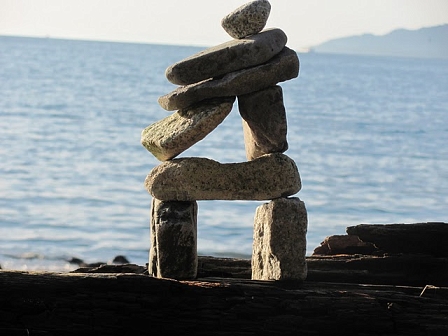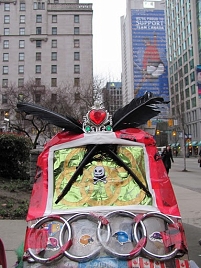Erstellt am: 20. 2. 2010 - 15:23 Uhr
The Olympics: Not Really THAT Bad

Johnny Bliss, 2010
Ahead of writing this article, I found myself in a bit of a dilemma. Up to a certain point, most of my Olympic coverage was focused on things which seemed to be going very badly. It was very easy for me to take the side of the underdog activist, the homeless addict, and the disillusioned taxpayer.
Since then, however, it has become extremely fashionable for the international press to knock the Olympics in Vancouver, and I've found myself in the awkward position of feeling the need to defend them.
Why? Because I find most of the recent criticism to be journalistically irresponsible, at best. The assertion that these will be the worst Olympics ever is just silly, and there is nothing pettier than focusing on faulty wiring at a concession stand while Canada is winning its second Gold Medal.
The people who are actually here for the games are not focused on the broken ice-cleaning machine. Whether or not you principally support the Olympics in their current form, enthusiasm for the athletes is contagious, as it should be. Without the athletes there would be no Olympics.
Criticism is Cool.

Johnny Bliss, 2010
Mind you, I have no problem with criticizing the Olympics. If you've read my previous articles on the subject, then you know I did so when I felt it was necessary, so as to tell an important side to the story that was not getting the coverage it deserved. My problem is with the field of journalism being reduced to taking cheap shots, spotting weakness in a high-profile victim and kicking them while they're down.
Ironically, even with the media in a bloody feeding frenzy, I have yet to read even one major article that touches upon the real effects of the Olympics on free speech, and the other issues I consider truly important.
The unfortunate issues the media has been so absorbed with include the following: 28,000 tickets cancelled for sports events due to weather-related safety issues; the inaccessibility of the Olympic flame; buses full with athletes getting lost or stranded on the way up to Cypress; and of course the tragic death of Georgian luge competitor Nodar Kumaritashvili.
I arranged to have an interview with Mark Adams, the Director of Communications for the IOC, in the hopes of informally being able to discuss the recent surge of negative press, and how this year's games really compare against previous ones. I found it a demoralizing experience.

Johnny Bliss, 2010
I'm not entirely sure if it was due to legal considerations, but I was unable to get Mr. Adams to tell me anything other than how fantastic it is all going, and how happy everyone is. Try as I might, I could not break through the mask, that is assuming it is a mask. I hope so.
Here I ask him about the story coining these the "worst Olympics ever."
With A Little Help From My Friends
If I had ended the story there, then I would be doing you as much a disservice as the journalists out there trashing the Olympics for sport.
(ha ha! Get it? For sport? ha ha ha!)
Fortunately for me, David Eby, the ever-helpful executive director of the British Columbia Civil Liberties Association (BCCLA), was willing to help me put many of the current issues facing Olympia into perspective.

Johnny Bliss, 2010
„I think [the IOC] were their own worst enemy in the lead-up to the games. They tried to repress any dissent, they were not transparent about what they were doing, […] there was no accountability for them. So now, for better or worse, all the things that are not working out for them are their own responsibility," he told me this afternoon.
"I think future Organizing Committees should embrace openness and transparency to avoid some of the pitfalls. Obviously weather isn't going to be solved by transparency, but some of the other issues they're facing […] are major factors in whether or not this games is deemed a success.“
Listen to the David Eby interview here.


